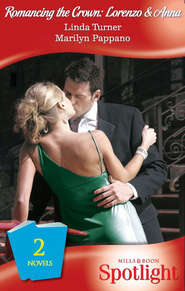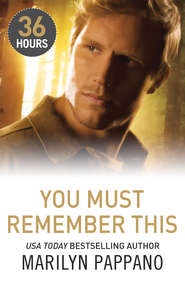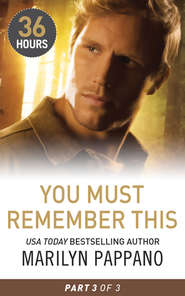По всем вопросам обращайтесь на: info@litportal.ru
(©) 2003-2025.
✖
The Sheriff's Surrender
Автор
Год написания книги
2018
Настройки чтения
Размер шрифта
Высота строк
Поля
Before he could open the pickup door, she wrapped her arms around his neck and hugged him tightly. “In case I don’t see you again, thanks for everything.”
“You’ll see me again. This is just for a few days. We’ll get you someplace safe, make our case against Forbes and put the bastard away again—for good this time. Then you can go back to life as normal.”
She wished she believed him, wished she was that optimistic, but the sick feeling in her stomach suggested otherwise.
He kissed her forehead, then pushed her back and opened the truck door. Swallowing hard, she climbed inside, fastened her seat belt, then raised her hand in a forlorn wave as Reese put the truck in motion.
The temperature inside the vehicle was frigid enough to raise goose bumps on her bare arms, but she suspected it had more to do with the driver than the air-conditioning. She didn’t look at him and couldn’t speak to him—couldn’t do anything but sit stiffly in her seat, head turned to stare out the side window. They left Killdeer soon enough, leaving her nothing to look at but trees, pasture and an occasional house, but that was hands-down better than the hatred she knew she would see if she looked at him.
The miles passed in strained silence, and the muscles in her neck grew taut from holding her unnatural position so long. Gradually, an inch or two at a time, she turned to face forward, then risked the quickest of glances at Reese from the corner of her eye. He was gripping the steering wheel tightly enough to make his knuckles turn white, and his posture was rigid and unyielding. Just like his attitude.
Of course the past nine years that had been so difficult for her hadn’t left a mark on him. He was older, handsomer, tougher. In denim and chambray, with the cream-colored cowboy hat, he looked like every woman’s dream of a gorgeous, sexy cowboy. Put him astride a horse, and hearts would swoon all over the place. Even without the horse, he was more than capable of stirring wicked fantasies.
The first time she’d ever seen him, she’d swooned. He’d just recovered from the shoulder injury that had ended his pitching career with the Kansas City Royals, and had gone to work for the Keegan County Sheriff’s Department. She’d been practicing law in the county seat of Thomasville. She couldn’t have cared less that he was a former hot-shot baseball player. Sports didn’t interest her much. But she’d been damned impressed with the man himself.
Too bad he’d never thought much of her.
Not even when he was claiming to love her.
With a shiver, she adjusted the vents so they blew away from her, then folded her arms across her chest. Feeling incredibly awkward, she locked her gaze on the road ahead and said, “I take it you’re still a cop.”
The silence that met her remark was oppressive. So this was what she had to look forward to for the next two days. Not a problem. She was experienced at being ignored by him—when she’d been shot, when she’d lain alone in the hospital, when she’d been harassed and threatened every single day until finally her tormentors had run her out of town. She could handle a couple of days of not being spoken to.
But as soon as she’d completed the thought, he did speak, in a voice as scornful and unforgiving as any she’d ever heard. “What did Jace tell you?”
“Nothing.” It was an adequate answer that needed no elaboration, but that didn’t stop her from adding it. “If he’d mentioned your name, I wouldn’t have come.”
“If he’d mentioned your name, I wouldn’t have let you.”
Fine. So they were agreed that neither wanted to spend even a moment together. The only problem was that the potential cost to him was merely a few days’ discomfort, while the cost she paid might well be her life.
She returned to staring at the scenery. Jace had refused to tell her where she was going, presumably so he could hide who she was going with. All he’d said was that it was a quiet place where she would be safe.
Safe. With the one person who hated her most providing her only security. Gee, why didn’t she feel safe?
Last night had been far from restful. She tried to doze along the way, but every time she was close to actually falling asleep, something brought her fully alert—some bump in the road, a honk from a passing vehicle, some little bit of fear deep inside her. She gave up her effort as they approached a sign that read Welcome to Heartbreak—Reese’s hometown and, no doubt, their destination.
She smiled thinly. It seemed appropriate that she should wind up in a place whose name described her life so perfectly.
The real, physical Heartbreak didn’t seem a much better place to spend her time than the intangible, emotional heartbreak where she’d spent much of her life. The businesses were on the shabby side, the houses nothing special, the town dusty and worn. They passed one grocery store, two gas stations and three restaurants, one hardware store, one five-and-dime, and a handful of other businesses before Reese turned off the main street into a tree-lined neighborhood.
Maybe the houses weren’t big or fancy, she amended, but some of them, at least, had a certain charm. The trees in these yards were decades old, unlike her own neighborhood where every house had the same variety of very young saplings planted in the same location in the identical handkerchief-size yards. Additionally, there was nothing cookie-cutter about the houses—no identical plans for every fourth or fifth house, no homeowners association decreeing what to plant, when to mow and what colors to paint. There was a sidewalk on either side of the street for skating and playing jacks, front porches attached to every house for watching life pass by and mailboxes ranging from the purely functional to the eccentric to the just plain silly.
They were more like homes than her house could ever be.
After a half dozen blocks, the street ended in a driveway that ran long and straight through a stand of trees to a house some distance back. There were pastures on all four sides, a large yard in need of mowing and a barn out back that looked about a hundred years old with what must surely be its original paint. In contrast, the house gave every appearance of being brand-new. Its log walls, sandstone foundation and brick-red tin roof hadn’t even collected a thorough coating of Oklahoma dust yet.
The garage was on the north end of the house. Reese pulled inside next to a black-and-white Blazer that said Sheriff on the driver’s door beneath the department seal. Was that a general proclamation that all the sheriff’s department vehicles carried, or did it signify that this particular truck belonged to the sheriff? Neely wondered, but she wasn’t about to ask. He’d made it uncomfortably clear that he had no desire to talk to her, and she intended to make it easy for him to ignore her.
The door from the garage opened into a utility room. Straight ahead was the kitchen, and down a short hall to the right was a bedroom. She followed him through the kitchen and dining room and along another short hall to a bedroom diagonally opposite the first.
“You can use this room,” he said brusquely. “Bathroom’s next door.” Then he pivoted and returned the way they’d come.
Neely hesitantly entered the room and set her suitcase on the bed. To say the room was decorated would be overly generous. There were no pictures on the walls, no knickknacks scattered across the furniture, no pretty pillows piled on the bed. At best, it was functional. The walls were pale green, the trim white, the carpet a serviceable hunter-green. There were only blinds, no curtains, at the windows. The furniture was antique oak—a bed, dresser, two night tables and an armoire, probably handed down through generations of the Barnett family.
The only antiques she had were handed down, too—just not from her own family. She doubted that a Madison had existed before her and her sisters who could afford or appreciate such treasures.
She didn’t bother unpacking—why, when she would be leaving the next day?—but went to the bathroom next door, then headed back to the kitchen. She’d had only a doughnut and coffee for breakfast and had missed lunch completely. Though it wasn’t long until dinnertime, she needed something to settle the queasiness in her stomach or she would have one more woe to add to her long list.
Reese was already in the kitchen, washing up at the sink. She stopped abruptly and considered sneaking back to the bedroom, then rejected the idea. She wasn’t going to behave like a prisoner. She’d been willing to go back to Kansas City, or to strike out on her own, but no, they’d brought her here. If Reese hated having her there so much, he could damn well stay in the bedroom and go hungry himself.
Sparing her only the briefest of glances, he dried his hands, then took sandwich makings from the refrigerator. While she washed her own hands, he sliced a tomato, removed bread and chips from one cabinet, plates from another. He made his sandwich, emptied a ton of chips on the plate, then carried both the plate and a cold beer from the refrigerator to the corner table.
Neely made her own sandwich, filled a glass with water from the tap and settled for eating at the counter and staring at the horses in the pasture out back. When she was a kid, she’d wished every night for a horse to talk to, feed treats and ride a time or two. When she’d met Reese, she’d often wished for the chance to see where he’d come from, where he’d been shaped into the man he’d become, and at odd moments in the past nine years, she’d wished desperately, hopelessly, to see him just one more time.
Funny how wishes could come true in ways you most certainly didn’t wish for.
From across the room came the sound of a glass bottle tapping against wood, followed by a hostile question. “What did you do to piss off this guy who’s supposedly trying to kill you?”
Supposedly. Her smile was bitter. Last night someone had fired fifty shots or more into the bedroom where she was sleeping, but Reese had no problem turning the incident into an allegation that might not have even happened. What kind of proof did he need before he could believe her? Seeing her get shot, falling to the ground, bleeding and in great pain? No, wait. Been there, done that…and he’d still walked away. Maybe if she died this time, he would believe her. Maybe then he could forgive her.
Her appetite gone, she dropped the rest of her sandwich onto the plate, then turned to face him. “I did my job,” she said coolly. “A lot of people out there have a problem with attorneys who do what they’re tasked to do under the law.”
“And a lot of people have a problem with attorneys who use the law to let murderers, thieves and other criminals go free.”
It was an old argument, one they’d had a hundred times, one that he’d refused to see from any viewpoint but his own. She wasn’t going to be drawn into it again.
Pushing away from the counter, she walked to the broad doorway that led directly into the living room. It was more rustic than the other rooms, with log-and-stone walls, a big fireplace, wood plank floors and leather furniture. Rough cedar beams laid on the diagonal covered the peaked ceiling, and another beam served as mantel above the fireplace, supporting a collection of pottery. An entertainment system filled the corner on one side of the fireplace, and a computer and desk occupied the other. Great—TV, movies and Internet access. What more did she need?
“Nice house.” Her glance in his direction was too brief to bring him into focus, but just enough to confirm that he was still there. “Small-town life suits you.”
She could actually feel the sharpening of his glare as her mildly offered barb struck home. Small towns, small minds, he used to say about Thomasville. He’d gone there from Kansas City for the same reason she had—to make a start. Influenced by Jace, he’d been looking for an entrée into the law enforcement community. He’d planned to stay a year or two, get some experience, then start moving up into positions of more authority in larger departments.
She’d been fresh from passing the bar and had wanted a place where she could carefully build her practice. She’d had dreams back then of making a name for herself as a defender of the downtrodden, as the woman who would make good on that pledge she’d said every day through thirteen years of public school—and justice for all. Especially for the poor, the minorities, the people without a voice who couldn’t afford hot-shot lawyers to protect them. She’d intended to be one of those rare hot-shot lawyers, with a price that was within everyone’s reach.
She’d failed miserably. Apparently so had he.
She went into the living room, to the leather chair-and-a-half that was obviously Reese’s favorite seat. The remote control and the TV schedule were on the side table, and the shade of the lamp there was tilted slightly to provide better light for reading. After kicking off her shoes, she sat and folded her legs on the seat beside her, turned on the television, then realized with a grimace that she still wore her flower-bedecked straw hat. She pulled it off and tossed it on the matching ottoman, then concentrated on finding something to watch on TV.
Reese came to an abrupt stop just through the doorway when she removed the hat to reveal her hair—or what was left of it. Nine years ago it had reached past her waist. For court she’d worn it in a prim-and-proper bun at her nape. One of his greatest pleasures had been removing every one of the pins that had held it in place, letting the cool silky strands fall over his hands, over her body, then kissing those strands back into some bit of order.
He doubted there was a single hair on her head longer than a few inches now.
Forcing himself to move naturally, he sat on the sofa. “Let’s get the rules straight. You can’t go outside. You can’t answer the phone. You can’t answer the door. If someone comes over, go to the guest room, close the door and stay there. If Jace doesn’t have a new place for you by tomorrow, you’re going to the Canyon County jail over in Buffalo Plains.”
Her gaze narrowed, and he felt a twinge of guilt. He wasn’t in the habit of locking up crime victims, but these were special circumstances that required extraordinary measures. Besides, as jails went, Canyon County’s wasn’t bad. It was located in the basement of the county courthouse, which was about eighty years old, solidly built of sandstone and just about the safest place in town in tornado season. She would likely be the only woman in the section designated for female inmates, and she could have a few amenities such as TV and real food.
“I’ve taken the liberty of removing the phone from the kitchen so you won’t be tempted to call anyone, and the alarm system is set, so don’t try to sneak out. If you have any thoughts of using my computer, surfing the Internet or sending an e-mail to someone—” he followed her gaze to the computer, its monitor displaying a brightly colored screen saver of tropical fish “—just know that everything’s password-protected. You won’t get far.”











